|
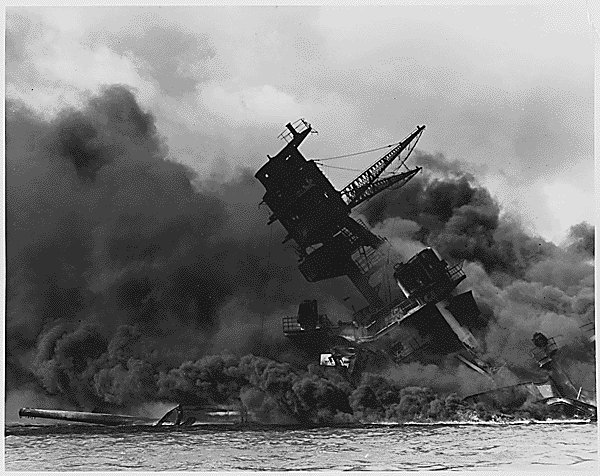
The Japanese attack on Pearl Harbor.
It was not a start, but a result.
It was like a man, whose neck was fastened by a tormenter, with
all his last strength before dying, tried to hit the tormenterfs face.
The
USA and Japan
fought against each other in the Pacific War during 1941-1945. Many American
people were taught that Japan
had done evil things in China,
so the USA was justified
in going to war against Japan.
But the truth was different.
The
true enemy of the USA and
of the world in those days was not Japanbut communism, which Japan
was fighting against. But, failing to recognize who the true enemy was, and
whom to fight against, the USAallied
with the Soviet Union and fought against Japan.
World War II Was Not "Democracy vs.
Fascism"
@@
Many American people were taught
that World War II was a war of "democracy vs. fascism." But this
was nothing but false, because Josef Stalin of the Soviet Union, whom the USA
was allied with to win the war, was a fascist and a more savage dictator than
Adolph Hitler of Germany. Stalin killed more than 20 million people of his
own nation, and he was planning to conquer the world with communism.

Stalin was a more savage dictator
than Hitler. He killed more than 20
million people of his own nation.
The USA was allied with this man.
Japan, whom the USA fought
against, was a democratic country which had no dictator, and where the
leaders were often changed by general elections. The Japanese constitution
fulfilled its function perfectly even during the war, and all important
policies were determined by discussions of the national assembly just as in
the United States. The Japanese leaders, including Emperor Hirohito, could
act only under the constitution and the Diet. They did not have any
conspiracy to conquer Asia nor the world, and their war was fought solely for
self-defense and protecting Asia.
@@
Thus, World War
II was not a war of "democracy vs. fascism." This idea was only war
propaganda made for the American public in those days. The USAmade mistakes in analyzing the
complex situation of Asia, mistook whom to
fight against, and whom to act with. In fact, six years after the Pacific War
ended, in 1951, the American General Douglas MacArthur, being asked in the
U.S. Senate about the Japanese war, looked back upon it and testified:
@@"Their
purpose, therefore, in going to war was largely dictated by security."
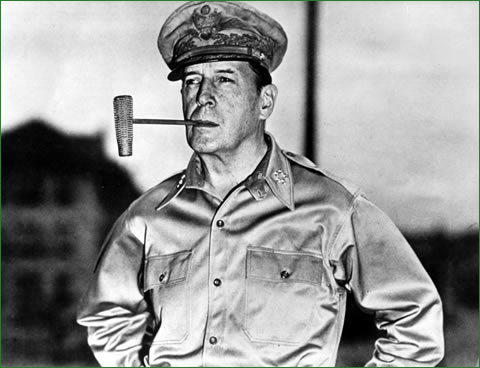
MacArthur testified that the Japanese
war was for self-defense.
MacArthur, who had
spent so much energy leading the fight against Japan, later realized the
Japanese war had been for "security," in other words, for
self-defense. And he added that the biggest mistake which the United
States had made in the 20th century was that
they allowed the spread of communism.
The Russo-Japanese War and the USA
@@
How did the war
between the USA and Japan begin? Why did the two have to fight? The conflict
did not begin suddenly when the Japanese attacked Pearl Harbor, but rather,
tensions had been building decades before Pearl Harbor.
Because soon after the Russo-Japanese War (1904-1905), which Japan
won against Russia, the
American people started to feel hostility toward Japan.
@@
Until the
Russo-Japanese War, the American people were generally friendly to the
Japanese, and the Japanese were thinking of the USA
as their mentor for modernization. Even during the Russo-Japanese War, the
American government's attitude was not bad. But when Japan defeated Russia,
the Americans saw that this yellow-skinned nation had won the war against a
white-skinned great nation, the American public's attitude became suspicious
of the Japanese.
@@
The
Russo-Japanese War occurred by the aggressive act of Russia
into Manchuria, which was located east of China
and north of Korea.
Japan fought the war against Russia for the security of Manchuria, Korea and
Japan.
@@
As a matter of
fact, prior to that, in 1894-1895 there had been a war between Japan and
China. The Qing dynasty of China
tried to subordinate Korea
to it, and Japan fought
against China to make Korea
an independent country. This war ended with Japan's
victory. Japan made Korea
an independent country, and also received from China
the Liao-dong peninsula of Manchuria
by treaty with China.
@@
But Russia
wanted this Liao-dong peninsula because it had ice-free harbors. Then, Russia,
in association with Germany
and France, exerted
strong pressure and forced Japan
to give the peninsula back to China
using a powerful argument. Japan
did not have the power to reject, so the Japanese regretfully gave the
peninsula back to China.
@@
After that, Russia
said to China,
"We returned the peninsula back to you, give us a reward." As a
result, Russia received
many rights and interests in China.
In addition, Russia
entered the Liao-dong peninsula and made it their own without any cost! Russia
did such a sly thing. But this was not the first time Russia
had engaged in such tactics, since this country had been doing the same kind
of things in many places, widening their territories with deception and
invasion.
@@
This expanding
country, Russia, was a
great threat to Japan
in those days. The giant country was trying to swallow Manchuria,
China, Korea
and then, Japan.
That was why Japan had to
fight the war against Russia.
This war was to protect East Asia and Japan from Russian invasion.
@@
Most of the
people in the world never imagined that this small country called Japan could
defeat that giant country. But Japan
miraculously won the war, although the victory was won by a slim margin. Japan
owed the victory much to the help of a great Jewish banker in the USA,
Jacob Shiff, who undertook much of the war cost for
Japan.
In those days there were many persecutions of Jews in Russia,
so he wanted Russia
to be punished. In addition, the American president, Theodore Roosevelt,
mediated between Russia
and Japan to end the war
and establish peace, so the feeling of the Japanese to the USA
in those days was nothing but gratitude and respect.
Change of the American People's Attitude
@@
But after the
Russo-Japanese war, strange rumors spread in the USA, and many absurd
articles appeared in newspapers such as, "Japan will easily take the
Philippines, Hawaii and then, all of the Pacific Ocean." It is said that
these rumors were set up by a Russian politician, Sergei Vitte.
This was one of a series of attempts by the Russians, who lost the war
against Japan, to take
revenge on Japan, and
make Japan out to be an
evil of the world, so that the Americans and Europeans may become suspicious
of Japan.
So, when the President Theodore Roosevelt commanded the American fleet during
a world cruise to visit Japan,
many people in the USA
and Europe including some military leaders
thought that the Japanese would surely attack the American fleet. But
contrary to expectations, the Japanese greatly welcomed them, so the American
president extolled the country as worthy of special mention during the
cruise.
However, such trust shown by the president was not in the majority. The
American government soon began to look upon Japan
as an enemy, and made a plan to control and suppress Japan.
That was called the "Orange Plan," for they used different colors
to distinguish countries, and Japan
was colored orange. This was made soon after the Russo-Japanese War, and
revised year by year, until finally it contained the plan to bomb the
mainland of Japan
to sweep away all the culture and the people, which is what really happened
in the Pacific War.
It was only about a half year before the war that the Japanese began to think
of the USA
as their enemy. Until then, the Japanese had trusted the Americans and
continued to try to be friendly to them, and never thought that Japan
would have to fight a war against them. But the USA
began to look upon Japan
as their enemy 35 years before the war, as mentioned above, and was preparing
to suppress Japan
year by year.
Racial Discrimination in the USA
We cannot say this plan to suppress Japan
had nothing to do with the fact that racism was strong in the USA
in those days. Different from today, colored people were the object of strong
prejudice and discrimination. The slavery of black people had been already
abolished; however, restaurants, toilets, buses, etc., were segregated
between white and colored people. The expulsion of the Chinese immigrants
already began in the 1800's, and it later turned especially to the Japanese.
Some Americans persecuted the Japanese by jealousy and prejudice, seeing that
the Japanese immigrants had succeeded with diligence.
Especially in California,
where there were many Japanese immigrants, writings were seen at stations,
rest rooms and street corners such as "Japs,
go away" or "Kill Japs." Barbers
refused the Japanese to come in, saying, "I don't do haircuts for
animals." In addition, real estate agents refused them saying, "If
the Japanese live there, the land value would decrease."
And right after the Russo-Japanese War, in 1906, when a big earthquake
occurred in San Francisco,
there was an expulsion movement of the Japanese, and the Japanese immigrants
were attacked and plundered. But Japan, which was subject to frequent
earthquakes, presented half a million yen at the time, which would be worth
about today's 10 million dollars, to California as an expression of sympathy
to recover from the damage of the earthquake. However, not only there was no
word of gratitude from California,
but also the Japanese pupils could not enter the schoolhouse which was
rebuilt with that money, and they were segregated to be educated in a
separate hut, although the teachers testified that the Japanese pupils were
good students.
Offer for Joint Management of the Manchuria
Railroad with the USA
Just after the Russo-Japanese War, an American railroad executive and a great
business man, Edward Harriman, visited Japan
to talk with Japanese leaders. At the time, as a result of the victory on the
Russo-Japanese War, it was already determined that Japan
would inherit the rights of Manchuria Railroad. Harriman met the Japanese
leaders and suggested, "I will provide for the cost of the Manchuria
Railroad. So, let us do a joint management of the railroad together."
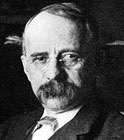
Edward Harriman
In those days,
railroads had a great meaning to widen territories of a country. If this
joint management of the Manchuria Railroad between the USA
and Japan was realized,
the USA would have got a
great opportunity to advance into Manchuria and China
without any hard work.
@
Some Japanese
leaders who met Harriman felt that it was a good idea. Because Japan
did not have enough money for managing the railroad since it was just after
spending an enormous amount of money for the war. Besides, the presence of
the USA in Manchuria
might be good also for Japan
to defend against the invasion of Russia.
The Japanese leaders promised temporarily that they would soon sign the
contract.
@
But the Foreign
Minister Jutaro Komura was not in Japan
at the time, since he was in the USA.
When he came back to Japan,
he objected strongly to that idea, saying, "We spent an enormous amount
of money and lost hundreds of thousands soldiers in the war. We can't hand
the rights over to a foreign country. It is also against the purpose of the
peace treaty."
@
Indeed the
rights were obtained at great cost to the Japanese, and the USA
would inherit the rights without any hard work. In the end, Japan
declined the offer, and decided to manage the railroad by itself. But this
disappointed many American people very much, and they began to accuse Japan
saying, "The Japanese are trying to monopolize Manchuria."
Racial Equality Bill Buried Away
Surely it was a fork in the road of history. Some Japanese historians say
that if Japan had
accepted the offer and began a joint management with the USA,
there would not have been a war between the USA
and Japan,
because both would have had the same interests. Undoubtedly, if there had
been the joint management, history would have gone a different way.
@
However, this
is only an assumption of "What if" and it is not more than an
imagination. Today's USA
and today's Japan could
have done such a joint management, but in those days, the USA
had many problems of racism. So, other historians express doubts about if
there would truly not have been a war.
@
In 1886, an
English ship named the Normanton sank by an
accident at sea, Japanese passengers were not saved and were left to drown,
when the captain of the ship said to them, "How much will you pay to be
saved? Say it. Time is money."
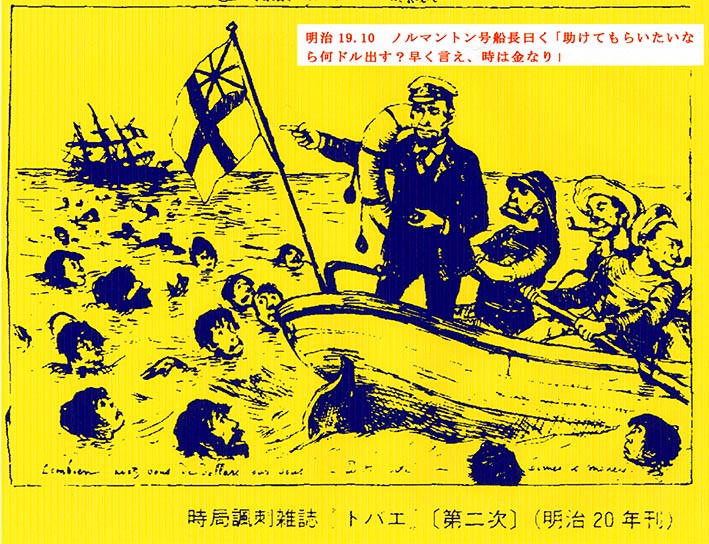
"How much will you pay to be saved?
Say it. Time is money."
The USA,
too, had the same kind of racist problems. In fact, after World War I, when
Japan proposed the Racial Equality Bill at the League of Nations Commission
during the Paris Peace Conference of 1919, the American president and the
chairman of the Conference, Woodrow Wilson, rejected and buried it away,
because racial discrimination was strong in the USA and the UK in those days.
@
In fact, Japan
was the first in history to propose the Elimination of Racial Discrimination
on the stage of international politics. When Japan
proposed it during discussions on the League of Nations charter, Italy,
France
and many countries agreed. The American Black Association was also very
pleased at the proposal, saying, "All the black people express the
maximum respect to Japan."
But the UK,
which had many colonies in the world, was strongly against it. Australia
also strongly disagreed, due to their "White Australia" policy. The
conference got into an imbroglio.
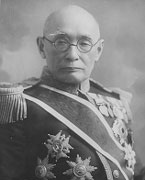
Japanese ambassador Nobuaki Makino.
He proposed a bill on racial equality
at the League of Nations Commission in 1919.
The voting result was
11 in favor of the bill and 5 against. It seemed that the bill passed. But
suddenly the chairman, American President Wilson, said, "It was not
unanimous, therefore, the proposal has not passed." Then, the Japanese
ambassador Nobuaki Makino stood, pressing the chairman to say, "We have
always decided every proposal by majority. Why do you suddenly say this must
be unanimous?" But the chairman did not listen to the ambassador and the
Japanese proposal was thus buried away. The USA
could not permit racial equality.
Woodrow Wilson is known as the president who insisted on "racial
self-determination," which had a great influence on the independence of
the nations of Europe, and for this he was awarded a Nobel Peace Prize. But
the "race" he meant was only European races, not Asian or African
ones. The colored people were not accepted as a human race. Thus, those days
were the age of racial discrimination.
So, if the USA and Japan
could have worked together on the Manchuria Railroad, it would have been
wonderful; however, it seems that it was difficult for Japan
to continue to work with such a country not admitting racial equality. It
seems that it was a historical inevitability that these two countries, the
United States which is symbolized with stars on the national flag and Japan
which is symbolized with the sun, would someday fight against each other.
USA Did Not Realize the Danger of Communism
In 1917, Russia became a communist country and changed its name to the Soviet
Union. But its expanding and invasive nature did not change, but rather
increased. In fact, the leaders of the Soviet Union
considered how to export their communism and make all the world communist
countries. The method in their mind was to export wars, and when the
countries became weak by the wars, it would be a good opportunity to
communize them. That is, the thought was, "if they fight against each
other, we would be the one to profit from it."
And they built the "Communist International" to realize the
purpose. The head office was located in Moscow,
and they began exporting the seeds of war to many countries. In such a time, Japan
was the only country in Asia which strongly
realized the danger of communism and fought against communists early on.
However, the USA
did not realize the danger at all, although some men of good judgment did.
For most of the American people it was just an incident of the same white
people, and something happening far away, not related immediately to their
own lives.
The Japanese understood communism to be the biggest menace to the world, and Japan's
consistent policy was to protect Asia from
it. For instance, in August, 1917, the USA
and Japan, along with the
UK, France,
China and Italy,
sent troops to Siberia to fight against the
Bolsheviks, the communists of that area. Japan
sent soldiers there because Japan
received a request of the countries to do so, and because Japan
knew the danger of the communism.
@@
But at the time
the USA kept a suspicious
eye on the purpose of Japan,
which had sent their troops, and besides, the Americans even showed a
friendly attitude to the Bolsheviks. Because the Bolsheviks were the people
who overthrew an autocracy, and in that sense they looked to the Americans as
similar to democratic people. To the eyes of the Americans the Bolsheviks
were not as bad as the Japanese who had advanced into Siberia.
Thus, in those days the Americans did not realize the danger of communism.
From around that time, Japan
had experienced many times the communist lies, deceits and invasions especially
in Manchuria and China.
For instance, in 1920 there was a mass slaughter of more than 700 Japanese
inhabitants who lived in Nikolayevsk, a city near Sakhalin.
They were attacked by communists and brutally massacred. And in 1939, the
Soviet troops invaded Manchuria, and there
was a great battle between the Soviet troops and the Japanese ones. After
both armies were greatly damaged, it ended with a cease-fire agreement, but
this made Japan
realize again the danger of communism.
In the same year in Europe, the Soviet Union absorbed Estonia,
Latvia, Lithuania,
Finland and portions of Poland
into their territories. The Soviet Union
swallowed up these countries with deceits, threats and their military forces.
In those days, some American people accused the Soviet Union of being a
crafty plunderer, but most of the American public were not interested in the
issue, and the American government later considered the Soviet Union as a
partner to fight the Pacific War.
Communist Spies Sent to Japan
and China
In Asia, Japan was the
only country which turned strongly against the communists, while the USA
was very slow to realize the danger of communism. And for the Soviet Union, Japan
was the biggest impediment to communize Asia.
That was why the Soviet Union tried to use the American armed forces to
destroy Japan.
For that purpose, the Soviet Union sent many secret agents of the Communist
International to China, the USA and Japan.
@@
Some of their
agents were sent to Japan, but the Japanese police strictly discovered and
arrested them. It is famous in Japan
that a German communist, Richard Sorge, entered Japan
and succeeded in sending some secret documents on important Japanese policies
to the Soviet Union. The information he
sent later contributed to the victory of the Soviet Union against Germany
and Japan.
Due to the information provided by Sorge, the
Soviet Union was able to delay invading Japan
until the USA defeated Japan
in 1945. Sorge himself was arrested as a spy
suspect just before the Pacific War and later executed.
@
The Communist
International also sent many agents to China
to help Chinese communists and make China
a communist country. The Soviet agents worked with the Chinese communist
leader Mao Zedong in every way, and also around Chiang Kai-shek were many
communist agents. Chiang himself was not a communist but was shrewdly managed
by the communists.
@
For the
communists, the biggest desire was to drag the USA into the war against
Japan, for Japan was the biggest impediment to communizing China, and the
only country with the power to destroy Japan was the USA. If they fought
against each other, there would be a big opportunity of communizing China.
In fact, on July 19, 1935, American ambassador to the Soviet Union, W.
Bullitt, informed his country that it was the biggest desire for the Soviet
Union to drag the USA
into a war against Japan.
In order to realize this, the communists used every method to make the USA
look upon Japan
as the enemy.
The "Tanaka Memorial" Forgery
@
One of the
methods which the communists took in China for this purpose was producing a
false document called the "Tanaka Memorial." This was an alleged
Japanese strategic planning document from 1927, in which Prime Minister Giichi Tanaka laid out for Emperor Hirohito a strategy to
take over the world.
@@
But it was
written in Chinese only, and there was no Japanese original. There were also
many mistakes and contradictions on dates and other details, so it was clear
that the document was a forgery. However, the translation of this document
was widely read in the USA among the senators and congressmen, who believed
that this item showed the malicious intention of the Japanese to take over
Asia and the world. They did not know that this document was written by
Chinese communists.
@
Besides,
American newspapers devoted a great space everyday to making Japan out to be
the evil of the world, especially the newspapers owned by William Randolf Hearst, a leading newspaper publisher, who was
said to be even to ginitiate a war in order to increase sales of his
newspapers.h He wrote up every demagogic article and baseless rumor that
Japanese were bad and invasive people ready to conquer even the USA. Thus,
many of the American newspapers became filled with such articles, and
provoked the American public.
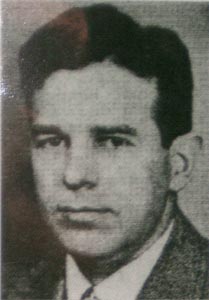
Ralph Townsend (1900-1975), American vice-consul
in Shanghai before the Pacific War. He appealed
that the USA should have trusted Japan to solve
the problems of China.
People who knew the
real state of affairs of Japan and China, such as Ralph Townsend who had been
an American vice-consul in Shanghai before the Pacific War for years, and
others, often pleaded that the enemy of the USA was not Japan, but the
communist internationalists who took control of the American mass media.
Townsend appealed that Japan
was indeed a good partner to the USA,
and the USA should not
have intervened in problems of China,
but rather the USA should
have trusted Japan to
solve the problems of China.
However, his voice never reached the American public. After Townsend came
back to the United States, he continued to appeal to the USA to trust Japan,
not to torture Japan. Townsend was a brave man and told the truth, but the
American government imprisoned him for a year just after the attack on Pearl
Harbor, saying that he had deluded the American public and done anti-American
activities.
@
Looking upon
the past, in order to make an excuse to persecute Jews, a forgery was
produced in Russia in the name of the "Protocol of the Elders of
Zion," which was an alleged plan of the Jews to take over the world, and
it was used in many countries to show the malicious intention of the Jews.
People who believed it thought that the Jews deserved to be killed. Likewise,
the same kind of forgery, named the Tanaka Memorial, was produced to make the
Japanese out to be the evil of the world. People such as Ralph Townsend said
many times that the Tanaka Memorial was a forgery, but their voice could not
stop the spread of this lie, and many of the general public in the Western
world believed it.
@
Roosevelt Was Surrounded by 300 Communist
Spies
@
The agents who
were sent from the Communist International were not only in China, but also
in the USA, especially around Franklin Roosevelt, who was the president when
the Pacific War began. Surprisingly it is known today that Roosevelt
was surrounded by more than 300 communist spies, who were in the Democratic
Party he belonged to, the White House, Department of State, Department of the
Army, and other government authorities. But in the Republican Party there
were almost none.

Franklin Roosevelt. He was surrounded
by more than 300 communist spies.
This fact appeared
in 1995-1996 when American professors searched the Russian National Archives
the files related to the Communist International, and they found among the
documents and the files called "VENONA" the lists of collaborators
to the Soviet Union. The lists showed that the American Democratic Party had
been filled with communist spies, and President Roosevelt had been making his
policies with them.
About this, the husband of a daughter of President Roosevelt, Curtis Dall, exposed the details from inside, writing in his
books that President Roosevelt had been a robot of the communist
internationalists, and it was all for the Soviet Union that he had driven
Japan into the war. Because of these many communist agents inside the US
government, American people after the war had to do a great campaign called
the Red Scare to purge all the communists from the government.
Hull Note Written by a Soviet Spy
@
One great
example of the achievements of the communist spies inside the American
government was the "Hull Note," which was the hard ultimatum
delivered from President Roosevelt and Secretary of State Cordell Hull to
Japan on November 26, 1941. It was the very one which made Japan finally
decide to attack Pearl Harbor. The draft of the Hull Note was not really
written by Hull himself, but was written by a
high official Harry White, who after the war turned out to be a communist spy
for the Soviet Union.
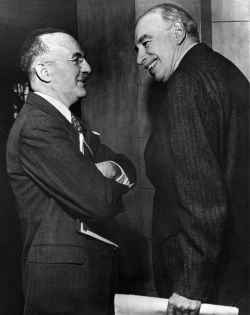
Harry White (left) who wrote the
Hull Note. He was a Soviet spy.
Before the Hull
Note, there had been many diplomatic negotiations for peace between the USA
and Japan for months, and
Japan
was preparing maximum concessions to it, but the content of the Hull Note was
to disregard all the past negotiations and it was a sudden rejection of all
the Japanese diplomatic efforts. The content was just equal to saying to
Japan "You, die!" It was so strict that Japan
could never accept it. To accept it would mean the national suicide for Japan.
What would the Americans feel if they were told, "The USA must go back
to the time it consisted of only 13 states"? The Hull Note delivered to Japan
resembled such a proposition.
Concerning this Hull Note, it is famous that Judge Radhabinod
Pal from India mentioned after the war at the Tokyo Trial (International
Military Tribunal for the Far East):
@"Even contemporary
historians could think that 'as for the present war, the Principality of
Monaco, the Grand Duchy of Luxembourg, would have taken up arms against the
United States on receipt of such a note.'"
As a matter of fact, the original draft of the Hull Note, which Hull
himself had in mind first, was not such a strict one, but rather a softer
one, and if it had been delivered, Japan
could have accepted it and made all Japanese troops return. The fleet which
was going to Pearl Harbor would have
returned. However, when the new draft that Harry White wrote came up, the
president liked it and said, "Proceed with this," and the very
strict Hull Note was delivered to Japan.
@
Reading it, the
Japanese leaders came to realize that their diplomatic efforts over the past
few months had all ended in vain, and they concluded that the only way left
was to fight against the USA.
They chose to die fighting rather than to die sitting.
@
Because the
Hull Note was a diplomatic document with great influence, it should have been
discussed in the American Congress beforehand, but no senators or
congressmen, nor the American public knew about its existence. The Hull Note
was delivered secretly to Japan
and it was hidden from the American public. Only Roosevelt, Hull
and some others, including Harry White who wrote the draft, knew. The
senators and congressmen, who later learned of the existence of the Hull
Note, became very angry but it was too late because the war had already
begun.
@
After the war,
it turned out that Harry White was a Soviet spy. Other arrested agents
testified that he was a spy, and soon he died a suspicious death after
leaving Washington.
White was a well trusted man and got a high evaluation in the Roosevelt
Government, but he was shrewdly managing the policies of the USA
for the Soviet Union. The code name of
White as a communist agent was "Jurist," and his activity was
called in Moscow
the "Snow Operation," due to his name. They were all working to
drag the USA into the war
against Japan, to destroy
Japan which was the enemy
of the communists in Asia, and they
succeeded.
Biased Views of President Roosevelt about
the Asians
And some causes of the Pacific War were much related to the biased views of
President Roosevelt about the Soviet Union, China and Japan. Since President
Roosevelt was surrounded by more than 300 communist spies, as mentioned
above, the president was much influenced by them and had an indulgent view on
the Soviet Union. For instance, he said
that if giving the Soviet Union what they
want, they would not invade or interfere with the American policies. He was
scarcely cautious about communism, and had indulgent illusions of that
communist country.
As for the Chinese, President Roosevelt often said, "I always feel
familiar with them," because his grandfather earned much money in the
opium trade in China
and the family became very rich. And even after Chiang Kai-shek killed
millions of Chinese fellow countrymen to protect his own interests, President
Roosevelt trusted Chiang and applauded him as a great leader of China.
@
In contrast,
the president believed that Japan
was an evil empire. This was because when he was young, he read a demagogic
story similar to the Tanaka Memorial, and strongly believed that the Japanese
were bad people with a malicious intention to conquer the world. In fact, he
once had a professor of the Smithsonian
Museum to study about
"why the Japanese are so malicious," and was satisfied to hear his
answer: "It is because their skull development is 2000 years behind
ours." And in his public speaking the president once compared the
Japanese to a virus, and talked about the "extermination of the
Japanese."
@
Thus, we can't
deny that the Pacific War was much caused by the biased views of President
Roosevelt. Unfortunately he did not realize that the true enemy of the USA
was not Japan, but the
Soviet Union, and that the USA
and Japan should have
cooperated with each other to save China.
@
Conflict in China between the USA and Japan
@
The direct
cause of the Pacific War was a conflict in China between the USA and Japan.
The communists used the conflict to let the USA
and Japan
fight against each other.
The USA
had been widening its territories by going to the west. Firstly, this country
obtained their territories of the West as far as California,
and then, the "frontier spirit" went farther and crossed the ocean.
The USA annexed Hawaii
by a military threat to the defenseless and peaceful Hawaiian
Kingdom, and later, got the Philippines
by a war against Spain.
The Americans justified these territorial acquisitions with their belief in
"Manifest Destiny," which was the thought that it was obvious
("manifest") and certain ("destiny") for the white people
to rule the colored and to civilize them, and that the USA
was destined to expand from the Atlantic seaboard to the Pacific
Ocean. It was an ideology to expand to the west more and more.
In the war against the Mexicans, "Remember the Alamo!"
was their slogan. And in the war against Spain, it was "Remember the
Maine!," which was an American battleship that exploded and sank. The
inquiries on the cause of the explosion had many contradictions but the
American mass media insisted that the explosion was caused by malicious
intention of the Spanish. Thus, the war against Spain
began. When the Americans began a war, a convenient incident always happened,
and the war always began with the "Remember" slogan.
The next target of the Manifest Destiny was China,
because the other Asian countries had already become colonies of European
countries. For instance, India,
Burma and Malaysia
were colonized by the UK.
The east part of Indochina (what is today's Vietnam,
Cambodia and Laos) was a French colony. Indonesia
was a Dutch colony. While, in China
there were many European and Japanese concessions, and China
was becoming a half colony, and was embroiled in a competitive process of
being divided and ruled by these countries. The USA
tried to enter into such China
under such conditions.
@@
For this
purpose, the USA
requested the countries an open-door policy, that is, the USA
asked, "Please let me in also." But the countries obtained the
rights and interests in China
with much expense, so, the USA's
request to enter into China
without any labor sounded a glib talking to them. It was not easy for the USA
to enter into China.
@@
And especially
since the great stock market panic of 1929, the USA
came into a tight bloc economy, which was a closed-door system of foreign
trade. The UK
also made a bloc economy. They abandoned a free economy and shut the door to
the other countries outside the bloc. That is, the USA
never opened the door to the others, but continued a persistent request to
open the door of China.
It was such a perfect double standard policy, and became a cause of the
conflict there. Especially the USA
thought of Japan to be
the most bothersome obstacle for the USA
to enter into China.
The USA could have lived
even in a closed economy, but Japan,
which did not have any natural resources, could not live without foreign
trade. Being shut out from the USA
and UK economic blocs, Japan
suffered greatly. It was not only Japan,
but also Germany, Italy
and many other countries that did not have natural resources, could not
sustain self-sufficient lives and suffered.
Japan was compelled to
make their own economic bloc in East Asia, but the USA,
which had abundant resources for their own, did not allow Japan
to do it, and tried to add more and more to what they had. Germany
and Italy
also were compelled to make their own economic blocs.
Many Americans were taught that World War II had been of "democracy vs.
fascism"; however, this was wrong because it was actually of "the
haves vs. the have-nots." The war occurred because "the countries
which did have" tormented "the countries which did not have."
Nine years before World War II, a Japanese scholar and pacifist Kamekichi Takahashi realized this and wrote a thesis
about how World War II would occur. After the war, the American occupation
forces removed him from public office because his thesis had hit the nail on
the head.
Manchukuo,
a New State
in Manchuria
Manchuria and China were
very important for Japan
to establish a self-sufficient economic bloc for Asia.
Let me explain about Manchuria first.
Manchuria was not China
because it is outside the Great Wall, and had never been a part of China
in all its history. And through the Japanese victory in the Russo-Japanese
War, Japan obtained the
rights of the Manchuria Railroad, so, it was Japan's
right and duty to modernize the land.
@
Manchuria
was not a sovereign state which had a government, laws and administrative
offices. To modernize the region, Japan
firstly cooperated with Zhang Xueliang, warlord and
substantial ruler of Manchuria. But Zhang
was a former bandit and exacted taxes very heavily from the inhabitants.
Besides this, he broke the contract which had been concluded with Japan,
and he obstructed the Manchuria Railroad. So, the Japanese army expelled him
and his influence, an action which the inhabitants applauded and rejoiced in
because they were released from the severe taxation.
Considering that Japan
was thus occupying Manchuria, the Western world did not understand the
situation and accused Japan.
But if the USA was placed
in the same situation as Japan,
I believe the USA
would have done the same. Due to the criticism of the Western world about the
Japanese occupation, Japan
had to withdraw from the League of Nations, but Sir Reginald Johnston, tutor
of the last emperor Puyi of the Qing Dynasty, who
knew well about the complex state of affairs of Manchuria, criticized the
Western world which did not understand Manchuria and the act of Japan.
In Manchuria, Japan built a new state called Manchukuo (meaning State of
Manchuria), but since the purpose of Japan was not to own the land, Japan asked
the last emperor Puyi to become the emperor of
Manchukuo, for he was a Manchurian and it was his homeland. Japan began
cooperating with Puyi to modernize Manchukuo,
making the government, laws, administrative offices, industries, schools,
hospitals, etc.. It developed amazingly, and more than one million immigrants
from various outside nations flowed into Manchukuo
every year, desiring to work there. It was such a land of fascination, or a
utopia, compared with the surrounding lands of Asia
which was full of civil wars, famine and poverty.
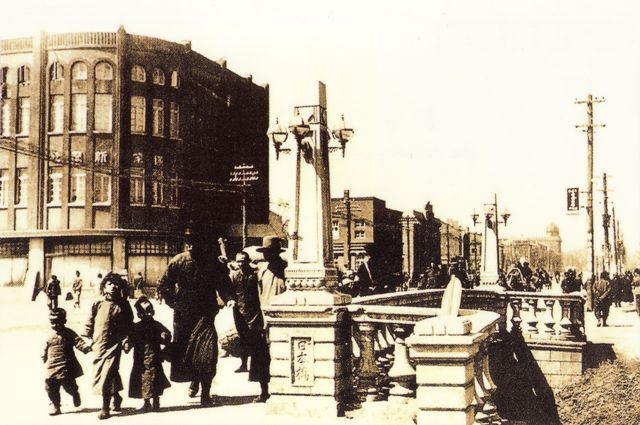
Capital of Manchukuo,
land of racial
equality. More than one million immigrants
flowed into the country every year.
The Manchurians,
Chinese, Mongolians, Koreans and Japanese cooperated with each other to make
it a modernized country. And many Russians, who disliked communism and
escaped from the Soviet Union, also worked
there. The waitresses working in deluxe dining cars of the Manchuria Railroad
were Russian ladies. Europeans and Americans could work there. Jews also
could live there safely. An American vice-consul in Shanghai,
Ralph Townsend, once traveled in Manchukuo
and wrote that there he met American business men, who all said, "I
really appreciate Japan,
since Japan expelled all
the bandits from Manchuria and made this
land safe for us and safe for business."
@@
Thus, Manchukuo
was a county of racial equality and of great development. If the country
still existed today, it would have become a powerful country and become like
the United States of America
in Asia. In Manchukuo,
Japan never shut the
economic door to the USA.
Townsend reported that he saw many kinds of American merchandise were sold in
stores of Manchukuo, including American tobacco, etc.. He also wrote that Manchukuo
and Japan were among the
biggest importing countries of American merchandise, and he wrote it was a
vicious lie that the American mass media reported that Japan
had shut the USA
out. Japan could have
cooperated with the USA
to develop Manchukuo if the USA
wanted to and if there had been no anti-Japanese movement in the USA.
And it would have benefited all the USA,
Japan, Manchukuo
and Asia. But history did not go that way.
China,
Land of Civil
Wars
Next, in what state was China?
Many people think that the Japanese military forces went into "peaceful China"
and began a war there. But it was not so. China
in those days was a land of civil wars, famines and starvation. China
did not have any established government, but was fragmented by many warlords.
Each warlord professed himself a true government and fought against the
other.
@@
The victims
were farmers who made up most of the Chinese population. The number of war
victims often reached several millions, and sometimes more than 10 millions.
Farming and environment were destroyed because of the civil wars, and it
caused famines and added a similar number of other victims. It is famous that
even human meat was sold in Chinese markets in those days. Thus, China
was a land of confusion, disorder, civil wars and death.
The Japanese, living next to China,
could not sit idly by and watch this miserable state of affairs. If we
compare it to a row house, China
was like a family living next to us and having many children. But the husband
and wife quarrel each other every day, throwing things and sometimes the
things break our windows and come into our rooms. Besides this, they do not
work and have no income, so some children starved to death. In this state of
affairs, we can't sit idly by and watch it, but want to do something for the
family.
And moreover, there was another reason that the Japanese could not sit idly
by. It was the invasive nature of the Soviet Union (Russia).
If the Soviet Union rules the land, the next target will surely be Japan.
Japan
will become isolated islands and become like a man with his neck fastened by
a rope, losing the power to reject it.
The exploiting nature of European countries was also a Japanese concern. The UK
once sold opium to the Chinese and when they tried to reject it, the UK
fought the Opium Wars against China
and forced them to buy. The Japanese saw that the Chinese people all behaved
as servants to the Europeans. The European countries exploited Asian
countries only for their own selfish purpose, siphoning off Asian resources,
and did not do anything good for the Asians.
So, what the Japanese desired was that China would be taken back into the
hands of the Chinese people, and become a strong independent country which
could reject the rules of the Soviet Union and of the European countries, and
then, cooperating with Japan and other Asian countries, make a prosperous
great Asia (East Asia Co-Prosperity Sphere) together.
@
For this
purpose, Japan accepted many Chinese students to study in Japan. The peak was
in 1906 and the number of the students reached 20-30 thousands. After they
came back to China, they
all became leaders of new China.
The Chinese revolutionary leader Sun Yat-sen, who
is often referred to as the Father of Modern China, also studied in Japan.
He once succeeded to make a republican government in China, but it had a weak
basis, and soon the government was taken over by others and failed.
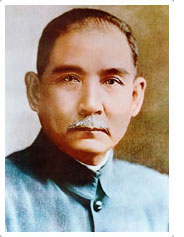
Sun Yat-sen. He learned in Japan
and
once succeeded to make a republican
government in China,
but soon failed.
Anti-Japanese Propaganda by the Americans in
China
China
became a land of confusion again. Since around that time, anti-Japanese
propaganda had been spread by the Americans who were in China.
In fact, the Japanese government wrote in the national defense white paper in
1923, "The USA built many institutions in China
with a malicious anti-Japanese propaganda, and is threatening the Japanese
presence in China."
@
At the background
of this, there was a biased view and romantic illusion of the Americans about
China.
The illusion was strengthened by the Nobel Prize-winning literature "The
Good Earth" written by Pearl Buck, which depicted indomitable Chinese
people. And James Hilton wrote his fantasy "Lost Horizon" which
popularized the mythical Shangri-La, alleged utopia in the interior of China,
and the fantasy was also made into a movie and recorded a breaking hit. In
addition, Henry Luce, founder of "Time" and "Life"
magazines, devoted himself to the spread of views which were pro-China and
anti-Japan.
@
They drew an
image of a "beautiful China"; however, they never wrote about a
dark side of China, such things as the case one of Sun Yat-sen's
secretaries, who became a Christian evangelist and was trusted by American
missionaries, but later, when he was deluded by nationalists of Chiang
Kai-shek, changed to the contrary and alas, on Christmas in 1926 in the city
of Hankou he betrayed his former brethren and began
an extermination movement against Christianity. The deluded crowds attacked
the city and almost all foreigners had to escape to Shanghai.
@
And in the city
of Fuzhou a pious female missionary, who did not have any children, seeing
with compassion a Chinese orphaned boy who was formerly treated as a slave,
took charge of him with love. She raised him expecting that he would be a
servant of God. But later, when the anti-foreign movement began, the boy
disappeared somewhere. Later, during some unrest in the city, she finally decided
to escape, when hoodlums appeared at the gate of her house. Alas, one of them
was that boy, and he was the one who took the lead in plundering.
@
Ralph Townsend
reported these and many other things, and he wrote in his book that the
Chinese did not know any obligation to kindness. He even often heard that
Chinese orphaned children, who had been brought up by missionaries with love,
said here and there, "My mother's property will soon be mine." This
kind of things was not unusual in China,
but China
was filled with such things. The Japanese also often experienced the same
kind of things in China.
@
But the
American newspapers and novels never wrote of such a dark aspect of the
Chinese. The missionaries also did not talk about these aspects, fearing to lose
financial support for their work. On this wrong view about the Chinese, the
Americans continued their biased pro-Chinese attitudes, and spread
anti-Japanese propaganda, believing that Japan
was an evil empire to rule China,
as written in the Tanaka Memorial forgery. And the Americans tried to make
the Chinese more and more anti-Japanese to drive the Japanese out and to
monopolize China.
How much the Japanese had to be patient with such a hardship in China!
@
Chiang Kai-shek's Change of Mind
@
After the
republican government of Sun Yat-sen failed, China became a land of civil war again, and
by far the biggest was the conflict between the communists led by Mao Zedong
and the nationalists led by Chiang Kai-shek. At first, the troops of Mao
Zedong were defeated by Chiang Kai-shek, and were on the verge of
annihilation. But an incident happened as follows, and it changed history.
Chiang Kai-shek was caught by communists during a careless moment in Xi'an
in 1936, and was taken to Mao Zedong, who really wanted to kill him. But
before killing Chiang, Mao asked Moscow
what to do. The answer was, "Do not kill him. Force him to fight against
Japan."
Mao followed this order and said to Chiang, "I will save your life if
you fight against the Japanese military forces!" Chiang accepted it and
then on, he was always being watched by the communists who had infiltrated
his troops.
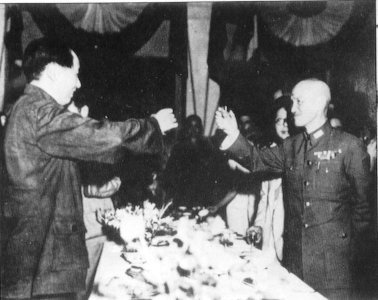
Mao Zedong (left) and Chiang Kai-shek (right).
This photo was taken in 1945. Chiang's change
of mind drove Japan
to the war.
By Chiang's change
of mind, Japan
was dragged into the Chinese civil war, for Chiang's soldiers began attacking
the Japanese people to provoke them to war. There were many cases where
Chinese soldiers attacked Japanese places of residence and brutally murdered
more than 200 Japanese and some Korean inhabitants in a gruesome
"Chinese manner," like piercing a woman with a stick from crotch to
head, or gouging out a man's eyes. As soon as the news ran all over Japan,
deep sorrow and rage filled the whole Japanese Archipelago. There occurred
many cases like this, but American newspapers did not report even one case or
even one paragraph.
@
The Japanese
kept patient about them. But on one night in 1937 at the Marco
Polo Bridge
(Lugouqiao) near Beijing,
where a Japanese garrison was stationed according to the treaty between China
and Japan,
Chinese soldiers fired their guns and there was a small battle between the
Chinese and the Japanese.
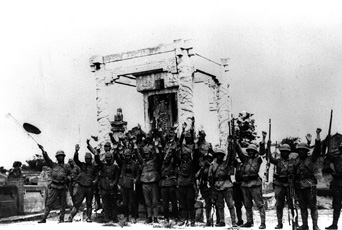
Japanese soldiers on Marco Polo
Bridge in
China.
The shots of the communists were the
beginning of the Sino-Japanese War.
As a matter of
fact, the first bullets were shot by communists, because the communist leader
Liu Shaoqi later proudly told that it was his
maneuvering. The Japanese tried to treat it as a local issue, but on the day
after the incident, the Communist Party of Mao Zedong said that the
Nationalist Party of Chiang Kai-shek should have begun the war against Japan.
And the Communist International ordered Mao Zedong to lead it to a full-scale
war, and kill those trying to solve it locally.
@
And soon after
that, Chinese soldiers in civilian clothing began to attack the Japanese in Shanghai.
And Chinese bombers bombed the Japanese Consulate General, the city streets,
ships, battleships, and even other countries' institutions to make a pretense
that the Japanese did it. The Japanese did not want to fight. However, the
Chinese wanted to fight, and a full-scale war began between the two at last.
To the next page
(The
Pacific War and the Basis of Racial Equality)
|
![]() The Pacific War: part 1
The Pacific War: part 1











